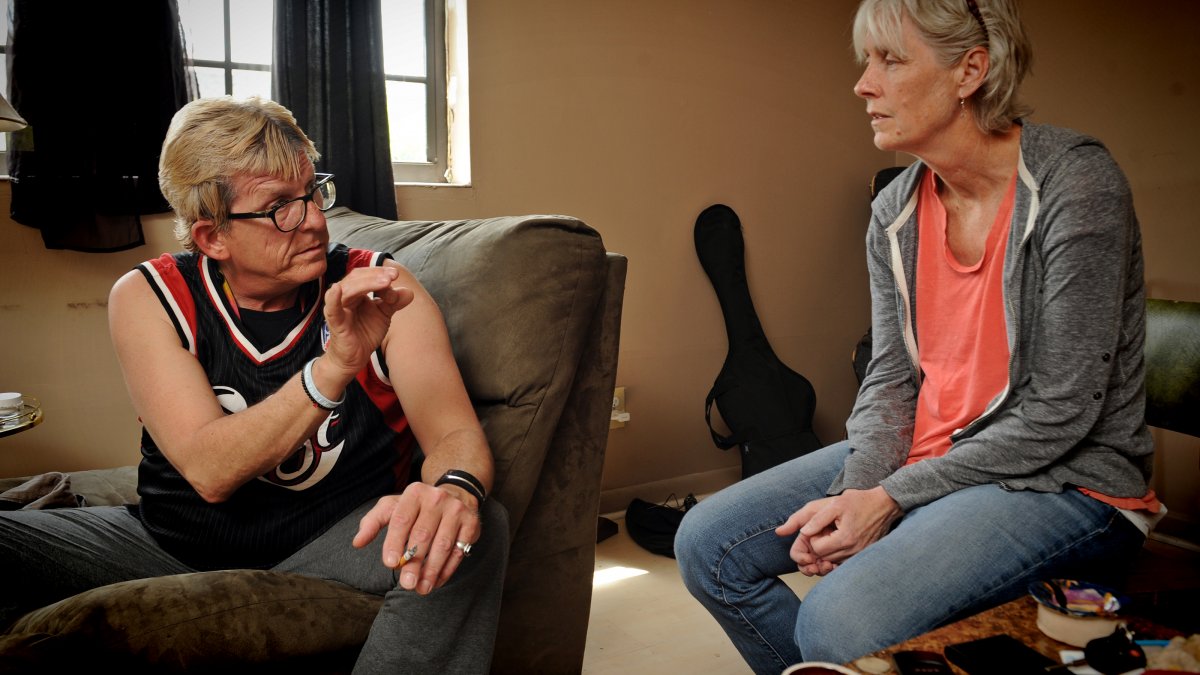Psychiatrists making house calls
Carol VanderZwaag, a psychiatrist on the UNC Assertive Community Treatment team and medical director for community services, helps clients battling serious mental health conditions including psychosis, schizophrenia and bi-polar disorder.

Carol VanderZwaag, aka Dr. V, has visited Tony once this week, but he still has some problems he needs to discuss, most of them concerning his calico cat, Daisy. She has a urinary tract infection and scratched Tony when he tried to give her the medication.
“Did you try mixing it in the soft food?” the doctor asks Tony.
“I mixed it in the nuggets she eats, and it took her forever, so I was afraid it would spoil,” he says.
Tony chain-smokes Pall-Malls as he talks, often letting a cigarette dangle between his first two fingers, lit end toward his palm. He’s dressed in gray sweats with a black basketball jersey and thick, black-rimmed glasses. He perches on the edge of a brown suede chaise lounge, which causes VanderZwaag to joke about how much it looks like the stereotypical psychiatrist’s couch.
But that’s the point. It’s not a psychiatrist’s couch. It’s Tony’s couch, in his small apartment with his cat threading her way between people’s legs in his den. Tony is at home and the doctor is visiting.
This doctor doesn’t wear a white coat. She’s dressed as casually as Tony: coral tank top, blue jeans, unzipped gray sweatshirt and flip-flops. Her green-rimmed glasses sit on top of her short blond hair.
She checks to see if he’s taking his meds, if he’s had any episodes. But the doctor often sounds like a mom or big sister. “Are you broke?” she asks Tony bluntly at one point.
A ‘holistic idea’ of mental health
VanderZwaag is a psychiatrist on the UNC Assertive Community Treatment (ACT) team and medical director for community services. She logs about 500 miles a week making house calls like this. Her clients have serious mental health conditions – psychosis, schizophrenia, bi-polar disorder – yet hospitalization hasn’t helped them. They can manage to live independently, with lots of support, which keeps them out of mental institutions and homeless shelters and off the streets.
ACT is a program of the UNC Center for Excellence in Community Mental Health, in the School of Medicine’s psychiatry department. The 13 members of the UNC team serve just over 100 clients in Orange, Chatham and Durham counties. A second team serves clients in Wake County.
An ACT team consists of a team leader, nursing staff, psychiatrist, housing specialist, vocational specialist, substance abuse specialist, peer support specialist and other mental health professionals. Team members do “rapid rounds” check-ins with up to five or six clients each day.
Each team practices “a holistic idea of what mental health is,” VanderZwaag says. “There’s more of a focus on the practical. It’s about knowing their home environment so you can tailor interventions to that environment. It’s about problem solving.”
Individuals are seen an average of 12 times per month for medication monitoring, symptom monitoring, therapeutic interventions and care coordination activities. Through a crisis line, a member of the team is available to clients 24/7, 365 days a year.
After her morning rounds, VanderZwaag crosses into Chatham County and drives her van down a bumpy dirt road whimsically called Penny Lane. At the end of the road is a building where she will meet with the rest of the ACT team for the midday binder check.
Members of the team sit around the conference table as one flips through the client contact log, a big three-ring binder. As she calls out a client’s first name, anyone who has visited that person and has an update lets the rest of the team know. VanderZwaag gives her update on Tony. Other team members report interactions from intervening in a crisis to helping a client apply for disability.
Outside the hospital
The ACT model was born in the 1970s, in an early wave of de-institutionalization for some mentally ill patients. Research studies showed that a team approach was most helpful to patients making the transition to independent living.
“We try to recreate the security and safety that they get in the hospital,” VanderZwaag says. “You can’t take people who’ve been institutionalized and expect them to live their lives without help.”
As the former medical director of the psychiatric rehabilitation unit at John Umstead Hospital in Butner, VanderZwaag empathizes with clients who don’t want to spend their lives in an institution. “We’re all glad to be outside the hospital,” she says with a smile.
Some clients, like Tony, will probably always need the intensity of the ACT program to help them live independently. But not all of them will. That’s why in May, UNC ACT moved 10 ACT clients to a pilot program called Step Down.
“We found that there is a whole group of individuals who are stable enough to receive less intensive care than what ACT provides, but are not necessarily ready to benefit from office-based treatment,” VanderZwaag explains. “Nothing under the ACT program was providing that middle step between intensive care and standard services, so we wanted to design a program that would fill in the gap.”
Step Down, designed at UNC and funded by Medicaid, calls for only four visits per patient each month instead of 12. Step Down clients are also eligible to receive services that ACT doesn’t provide, like specialty psychotherapy.
VanderZwaag is glad to see some of her clients transitioning from ACT to Step Down. One just opened his own retail business, she says proudly.
“Things in your life can get disrupted by getting an illness in your 20s,” VanderZwaag says. But that doesn’t mean that the mentally ill need to stay in institutions for the rest of their lives. Programs like ACT and Step Down are there to help them adjust to the outside world, to embrace, eventually, a “normal” life.
“It’s nice to see someone get a job or fall in love and get married,” she says.




